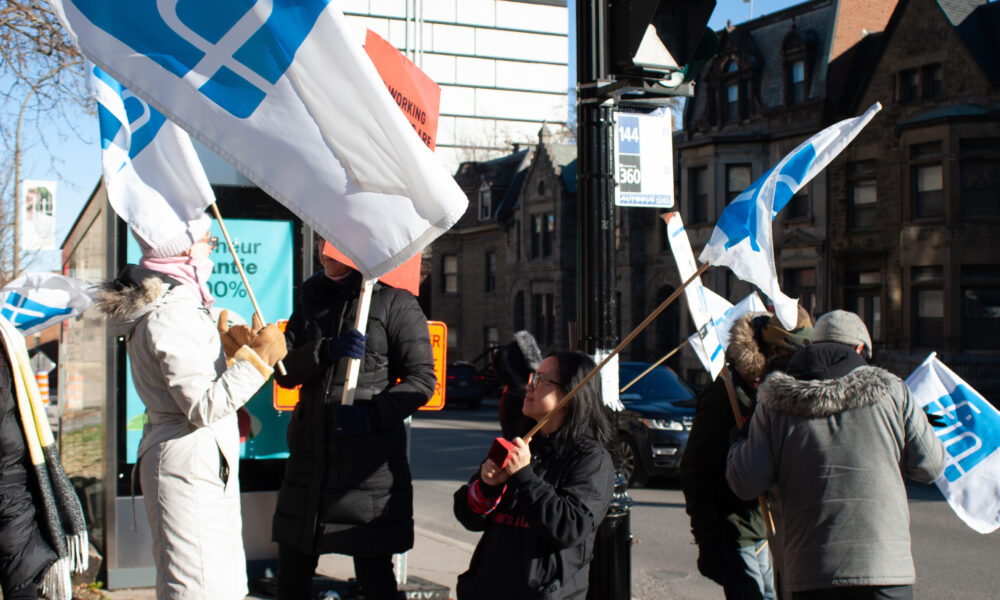With 800 schools closed indefinitely, CÉGEPs shut down, almost a thousand surgical procedures postponed, and operating rooms limited to 70 per cent capacity, Quebec’s public sector strikes are clearly causing disruption. But what are the origins of this strike? And how does it impact students?
Why are public sector workers striking?
Nearly 570,000 Quebec public sector workers have joined forces to demand higher wages and better working conditions. Four unions spearheaded the mobilization—the Confédération des syndicats nationaux (CSN), the Centrale des syndicats du Québec (CSQ), the Fédération des travailleurs et travailleuses du Québec (FTQ), and the Alliance du personnel professionnel et technique de la santé et des services sociaux (APTS)—who have come together to form the Front commun, representing nearly 420,000 workers.
The Fédération interprofessionnelle de la santé du Québec (FIQ) and the Fédération autonome de l’enseignement (FAE), represent an additional 80,000 and 65,000 public sector employees respectively; both of which have decided to negotiate separately from the Front commun, but are also on strike.
The Front commun demands higher wages and stronger benefits, as employees’ living conditions have been severely affected by the rising inflation. To achieve this, they are proposing a three-year contract with annual salary increases linked to the rate of inflation. These increases would raise salaries by two per cent in the first year, or $100 a week, followed by an increase of one per cent a year until the third year.
What are the recent developments of the strike?
On Nov. 29, after a “constructive” meeting with Sonia LeBel—the minister responsible for Government Administration and President of the Conseil du trésor—failed to make any major headway, the Front commun announced seven new strike days, from Dec. 8 to 14, and affirmed that the next step would be an unlimited general strike. The FIQ will follow, with strikes from Dec. 11 to 14. The FAE commenced an unlimited strike on Nov. 23 and seems determined not to give up. The stated aim is to sign a principal agreement before the holidays, hence the growing pressure on the government.
How has the public responded to the strikes?
Even as Quebec residents are experiencing impacts directly from these strikes, locals overwhelmingly support this mobilization. According to a SOM poll conducted between Nov. 17 and 20, 78 per cent of Quebec residents support the public sector strikes, compared to only 12 per cent supporting the government’s approach.
In an interview with The Tribune, François Enault, first vice-president of the CSN, explained that the public sector can continue to rely on public support for strikes and expressed confidence over the current dynamics of the negotiations between the unions and Quebec government.
“The public will continue to support us. Right now, if I were in government, I’d be more nervous about public support for the government than for the workers,” Enault said. “The balance of power [between the union forces and the Quebec government] is very good. It hasn’t been this good for years.”
How do the strikes affect McGill and its community?
In a written statement to The Tribune, McGill media relations officer Frédérique Mazerolle explained that while Quebec public sector strikes do not directly affect McGill employees, the strikes may affect staff’s private lives.
“It is conceivable that [the public sector strikes] could have consequences for the professional performance of McGill employees, particularly in terms of managing family obligations,” Mazerolle wrote. “In these circumstances, the University encourages employees to communicate their needs and challenges with their immediate supervisor.”
Antonina Nikolaev, U2 Arts, VP Finance of the History Students’ Association (HSA), and President of the McGill Polish Students’ Association (MPSA), believes that these strikes are affecting all students at McGill, as the entire Montreal community is feeling more strain in its public service sectors.
“The Quebec public sector strikes affect McGillians and their access to services such as healthcare, which already had long wait lists and waiting periods,” Nikolaev wrote. “This can seriously affect McGillian’s health, mental wellbeing and time management, and having all this happen right around finals season is all the more stressful.”
All Front Commun unions will convene their governing bodies on Dec. 18 and 19 to take stock of the situation.









